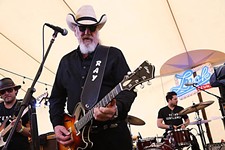Take Me to the River
Rock & Roll Books
By Ed Ward, Fri., Dec. 29, 2000

Dark Midnight When I Rise: The Story of the Jubilee Singers Who Introduced the World to the Music of Black America
by Andrew WardFarrar, Straus & Giroux, 493 pp., $27
In the dark days after the Civil War, everyone in show biz knew that the newly freed slaves loved to sing and dance and play on de ole banjo, as evidenced by the "nigger minstrel" shows that toured to such great acclaim. Trouble was, none of the music included was written or performed by black people themselves. Unsurprising: There was still something of a debate as to whether or not they were truly human.
George Leonard White, a tubercular giant of a man, was the treasurer of Fisk Free Colored School (later Fisk University) in Nashville, and he hit on an idea: Why not assemble a small choir of students to sing the religious songs, "spirituals," which they'd sung in secrecy during slavery, and tour, putting on concerts to benefit Fisk? An audacious plan, and, as it turned out, not too well thought-out. Although White had drilled the original 10 singers to perfection, he hadn't counted on their being rejected by railroads and hotels when he accompanied them on tour. Raising a pittance at each concert, the "Jubes" soldiered on until they reached Brooklyn.
Everything turned around in Brooklyn: Singing in Henry Ward Beecher's Plymouth Church, they were met with astonishment and awe -- and cash. They also took sick, died, got swollen heads and went solo, fought among themselves, and had to deal with bootleggers of the songbook they sold and other hastily assembled "Jubilee" singers representing nonexistent colleges. Fortunately, they had learned to read and write, making it possible for historian Andrew Ward (no relation to reviewer) to meticulously document their story from their own letters home and diaries. And a fascinating story it is, even if Ward feels he has to contextualize it with the entire history of slavery (and the anti-slavery movement) and religion among African-Americans. This can slow the book down, but it does, I think, help the reader understand the attitudes the Jubes met as they blazed a trail into the unknown.
Their last tour ended in July, 1878, well before the invention of the phonograph, so we'll never know what the Jubilee Singers sounded like, although from some of the contemporary reviews here (positive and negative), we can guess that some of the hallmarks of gospel singing as we know it today were present in their style. That aside, this book generously fills in the rest of the details, opening the curtain on a story that continues to this day. You'll never hear "Swing Low, Sweet Chariot," a song the Jubilee Singers introduced, the same way again.







